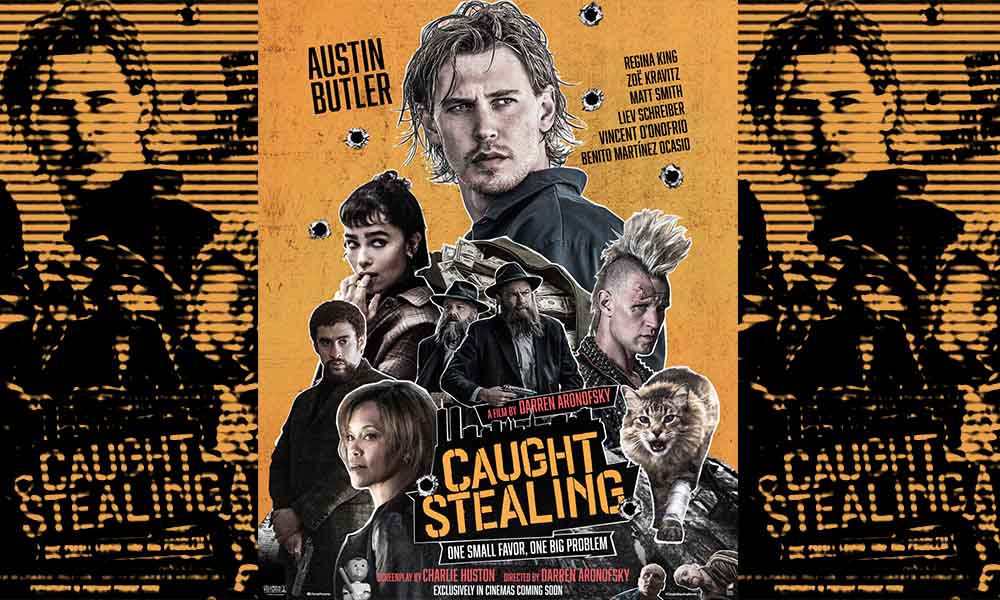Film Review | ‘Caught Stealing’: A Grimy, Comedic-Noir Portrait of Pre-Giuliani New York

More than a crime caper, Darren Aronofsky’s Caught Stealing is a portrait of a city on the cusp of transformation. New York City in the late 1990s was still gritty, strange and alive with competing subcultures before the yuppies fully staked their claim. The film’s Jewish elements don’t dominate the narrative, but they thread through it in ways that deepen the sense of place and history.
It is a kind of homecoming for Aronofsky, a Jewish filmmaker. Back in 1998, the same year his new film takes place, he released his surreal indie debut Pi, a black-and-white fever dream of Jewish mysticism and obsession. That film unfolded in the shadows of deep Brooklyn, a strange intersection of the various subsystems at work, whether Kabbalistic codes, Jewish rituals or Wall Street numbers. While looser and more violent, Caught Stealing (which is based on the eponymous novel by Charlie Huston, who also wrote the screenplay) feels like it could be taking place in the apartment down the block.
The interplay of violence and Jewish domesticity captures something central about the Jewish presence in New York: survival through adaptation and toughness forged in diaspora, yet everything still pauses for Shabbat dinner.
Austin Butler (Elvis, Dune: Part Two) stars as Hank, a failed baseball prodigy from small-town California. Possessing a scarred past, he spends his nights tending bar at a dive in Alphabet City. Life seems pretty good for Hank. He is seeing an EMT named Yvonne (Zoë Kravitz) and enjoys his booze quite a bit. His life takes a turn when his “Oi Oi” English punk rock neighbor Russ (Matt Smith) asks him to cat sit. All of a sudden, Hank finds himself mixed up with Russian gangsters, crooked cops, Puerto Rican hustlers and, memorably, a pair of Hasidic gangsters played by Liev Schreiber (Spotlight) and Vincent D’Onofrio (Full Metal Jacket), clearly relishing every second of screen time. They all seem to be looking for a big pile of money that Russ may have hidden somewhere.
Cinema has long been fascinated with Jewish gangsters, most notably figures such as Meyer Lansky and Bugsy Siegel. Here the Hasidim are woven into the city’s wider criminal ecosystem. They’re not caricatures so much as part of the tapestry of New York, a reminder that Jewish life, like every other community’s, has its contradictions and shadows. The film’s best sequence might be when the gangsters take Hank home to their bubbe, played by Carol Kane (last year’s Between The Temples), who won’t let anyone leave without a bowl of matzoh ball soup (least of all Hank, whom she finds to be alarmingly skinny). It’s both comic and grounding. This interplay of violence and Jewish domesticity captures something central about the Jewish presence in New York: survival through adaptation and toughness forged in diaspora, yet everything still pauses for Shabbat dinner.
Aronofsky had his breakthrough film with 2000’s Requiem for A Dream, a harrowing ensemble piece and portrait of addiction. Nobody could watch that film without feeling a little bit worse. With Caught Stealing, it appears he still can’t resist a good dose of grimness. The violence escalates quickly, while the soundtrack, packed with period pop hits from the likes of Smash Mouth and Meredith Brooks, strains to offset the brutality. (Side note: I was only 12 years old in 1998, but the former college radio manager in me grimaced at the idea of people dancing to “Walking On The Sun” or singing along to “Bitch” in an Alphabet City dive bar back then.) Martin Scorsese’s 1985 film After Hours serves as a primary influence for Caught Stealing; however Scorsese is an artist who can take grime and make it exhilarating, while Aronofsky takes grime and packs it in sorrow. Somehow though, he seems to think he’s bringing a big bowl of laughs.


Still, around the halfway point, when the story lands at a Mets game at Shea Stadium, things lock more into focus. The film clicks into a higher gear and takes a wild ride straight to the end. What emerges is both a violent romp and a reflection on New York as a city of outsiders, where Jews, Russians, Puerto Ricans, punks and working class citizens hustle and duke it out for their slice of the pie. A slice that they have been historically disenfranchised from getting through the more permissible, traditional routes. Schrieber and D’Onofrio (named Lipa and Shmully) may draw laughs, but they also show how Jewishness in New York is woven into the city’s culture, its shadows, its dangers, its character and its vibrancy.
If nothing else has convinced you to give the film a try, I’ll just add that if you’ve never heard Austin Butler mutter “mitzvah” in his semi-stuck Elvis drawl, you are really missing out.
